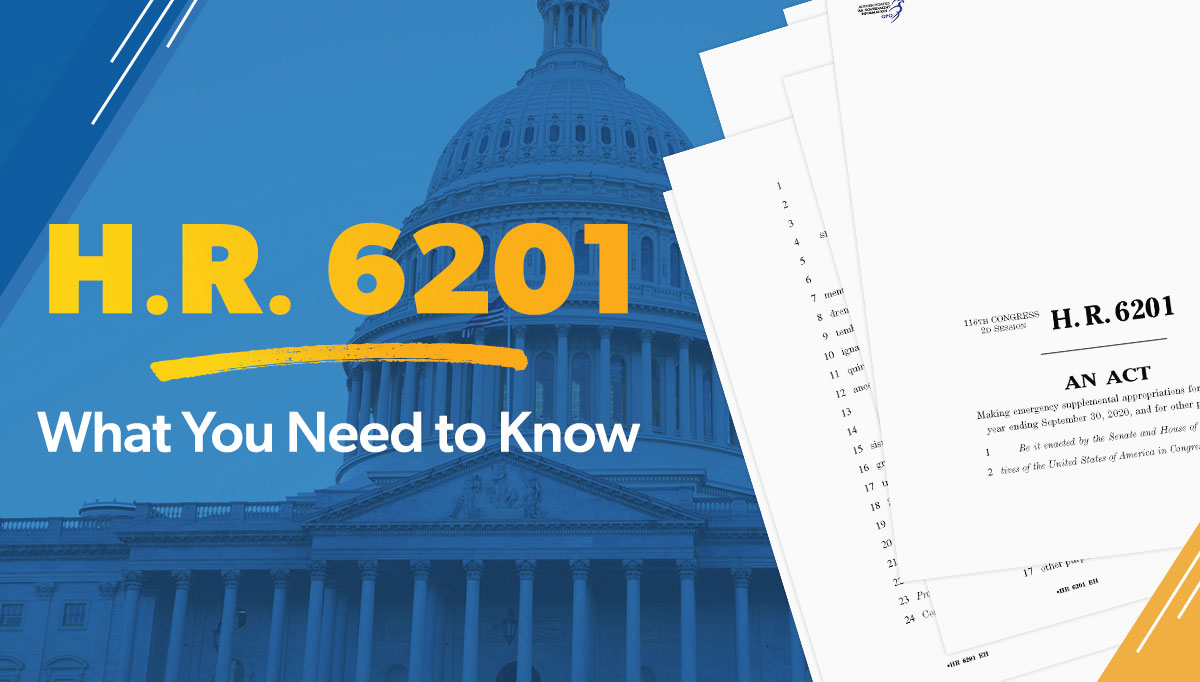On March 14, 2020, the U.S. House of Representatives passed H.R. 6201, also known as the Families First Coronavirus Response Act, a relief package designed to help workers financially impacted by the global COVID-19 pandemic.
Currently, 24% of American workers—that’s over 33 million people—don’t have access to paid sick leave through their employers.1 This new law will temporarily change that for employees affected by COVID-19, as well as expand the provisions of the Family and Medical Leave Act (FMLA) of 1993.
Please note, this bill only applies to employers with fewer than 500 employees. The U.S. Department of Labor may exempt employers with less than 50 employees at a later date if they’re at risk of going out of business.
It’s important to understand how H.R. 6201 will impact your company. Here’s everything you need to know right now.
What Is H.R. 6201?
On March 18, 2020, President Trump signed the second coronavirus aid package—H.R. 6201: The Families First Coronavirus Response Act—into law. The two parts of the bill that will immediately affect your company are:
- The Emergency Paid Sick Leave Act
- The Emergency Family and Medical Leave Expansion Act
What Is the Emergency Paid Sick Leave Act?
The Emergency Paid Sick Leave Act is a benefit under H.R. 6201 that allows employees to take up to two weeks of leave with 100% pay. All full- and part-time employees of companies with fewer than 500 employees are eligible for benefits under the Emergency Paid Sick Leave Act if:
- They are experiencing symptoms of COVID-19.
- A health care provider has advised them to self-quarantine.
- They are subject to a federal, state or local quarantine.
- They are caring for their children (under age 18) whose school or place of care has been closed due to COVID-19.
- They are caring for someone who is self-quarantined or is subject to a federal, state or local quarantine due to COVID-19.
So financially, what do the numbers look like? It’s pretty straightforward. Full-time employees will receive 80 hours of paid sick leave. Part-time employees will be paid for the average number of hours they typically work during a two-week period.
If you already give your employees two weeks of paid sick leave, bravo! But note, under the Emergency Paid Sick Leave Act, your employees get to use this government-mandated paid leave first before dipping into the paid sick time you provide.
It’s also important to note under H.R. 6201, it’s your responsibility to inform your employees of their rights under the Act. If you need help doing so, the Secretary of Labor is required to create a written notice about the Act by March 25, 2020. Stay tuned.
What Is the Emergency Family and Medical Leave Expansion Act?
The Emergency Family and Medical Leave Expansion Act (Emergency FMLA Expansion Act) is, as the name suggests, an extension of the current FMLA. All employees of companies with fewer than 500 employees are eligible to take up to 12 weeks of job-protected leave under the Emergency Family and Medical Leave Act if:
- They have worked for the employer for at least 30 days.
- They are unable to work because their child’s school or place of care has closed due to COVID-19 public health emergency (note: child must be under 18 years of age).
The first 10 days of this leave are unpaid. However, an eligible employee can choose to use paid sick leave or accrued vacation days during this unpaid period. After the initial 10 days, an employer is required to pay employees two-thirds of their normal wages, up to $200 per day and $10,000 in total.
When Will H.R. 6201 Go Into Effect?
H.R. 6201 takes effect no later than 15 days after enactment, which means your employees are eligible for benefits under both the Emergency Paid Sick Leave Act and the Emergency FMLA Expansion Act as of April 2, 2020, through the end of the year.
Are Businesses With 500 or More Employees Obligated to Pay for Sick Time or Extended Leave?
Right now, the answer is no. And it’s not clear if amendments will be adopted later to include employers with 500 or more employees. However, those businesses are required to adhere to FMLA and any laws in their state mandating paid sick leave. Currently, only 12 states and Washington, D.C., have enacted paid sick leave laws.2
What Does This Mean Long-Term for My Business?
The benefits of H.R. 6201 for employees are substantial, and, fortunately, the bill provides some relief for their employers too.
You probably thought running a business sounded fun—until you realized it would actually run you. Discover the EntreLeadership System—the small-business road map that takes the guesswork out of growth.
That means employers will receive:
- A refundable tax credit equal to 100% of qualified family leave wages paid under the Emergency FMLA Expansion Act for each calendar quarter.
- A refundable tax credit equal to 100% of qualified sick leave wages paid under the Emergency Paid Sick Leave Act for each calendar quarter.
Want to Know More About H.R. 6201?
We’ve highlighted two parts of this comprehensive bill, but you can check out the Families First Coronavirus Response Act in its entirety here.
Need More Business Advice?
These uncertain times may feel scary, but you’re not alone—you WILL get through this. Right now, we are offering free resources for business owners just like you to help create a plan of action, connect with your team, and drive your business forward.
Read the full article here


















